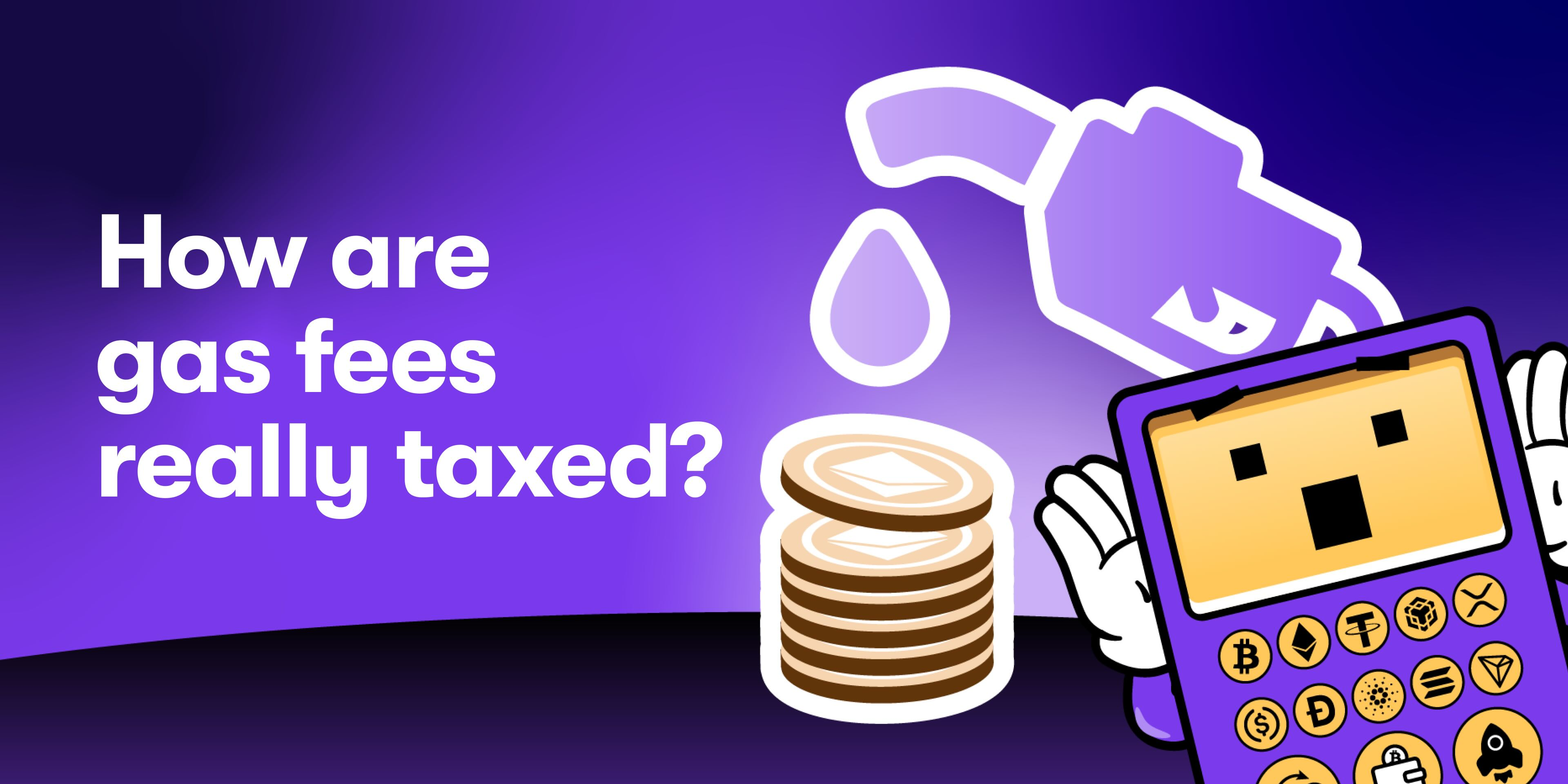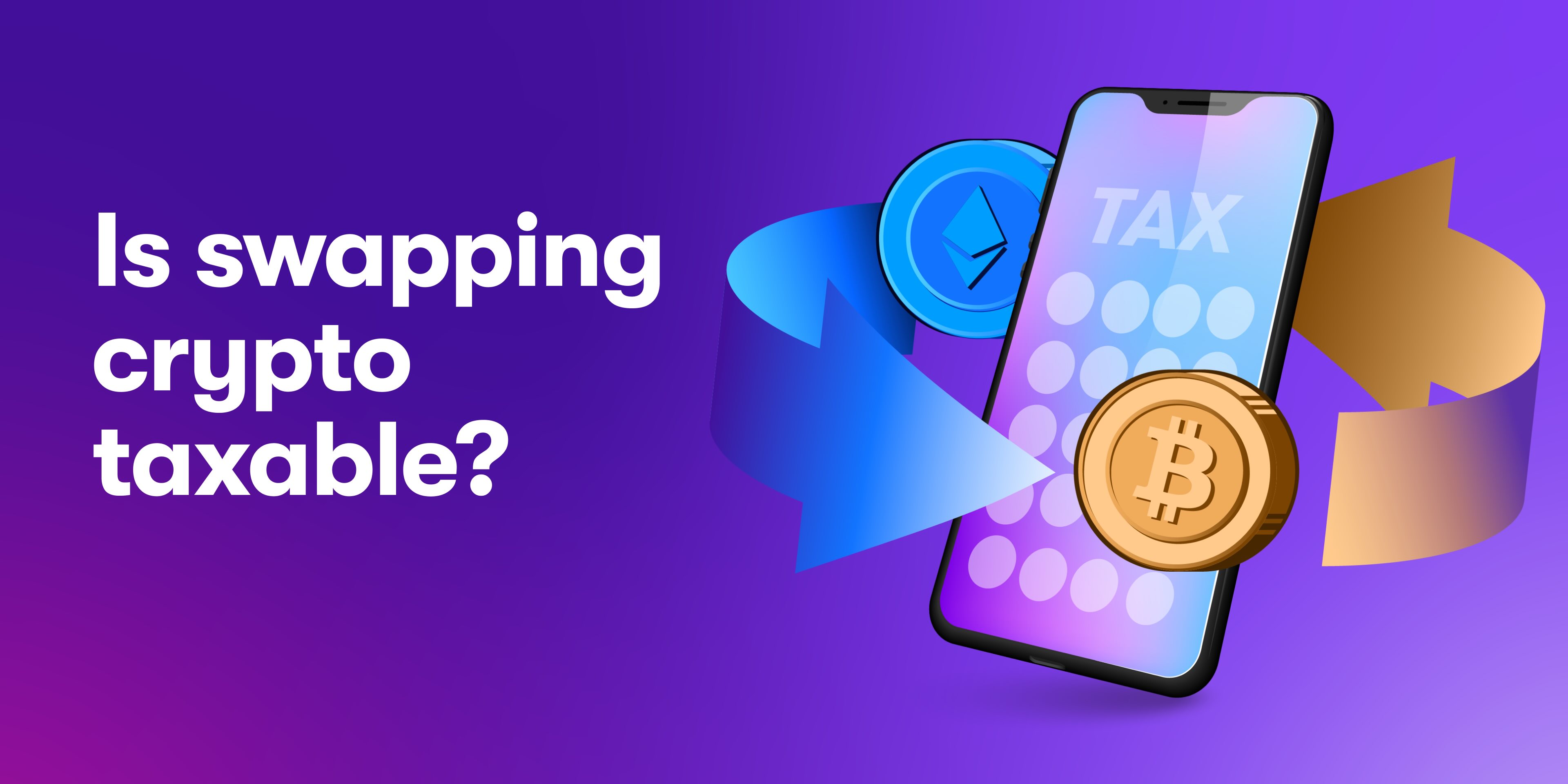Gas fees, or transaction fees, are often an unavoidable part of crypto transactions.
If you’ve ever traded on the Ethereum network, chances are you’ve paid hundreds (or even thousands) of dollars in ETH gas fees. While no one enjoys paying transaction fees, understanding how they’re taxed could help you offset some of your gains. So, how exactly do you report crypto gas fees and are they tax deductible?
In this guide, we’ll take you through:
{{eth-gas-fees-tax-cta-1}}
{{eth-gas-fees-tax-callout-1}}
Are crypto gas fees taxable?
Taxes are owed whenever you sell, swap, or dispose of crypto, regardless of whether you gain or a loss.
In the United States, when you use crypto to pay for a transaction fee, this triggers a capital gains tax event. The taxable gain or loss is determined by the difference between the crypto token’s value when you acquired it and its value at time of the transaction.
Example:
- You buy 1 ETH for $3,000 to use for fees.
- Later on, you conduct a trade where you sell 10,000 PROPC and buy 1 ETH.
- The transaction fees are paid in ETH, and the gas fee is 0.1 ETH. However, by the time of the trade, the price of ETH has gone up to $4,000.
- The acquisition value of the 0.1ETH was $300 (0.1 x $3,000) and the disposal value of the ETH was $400 (0.1 x 4,000).
- This triggers a capital gains event, with a gain of $100 ($400-$300) from the sale of the ETH that was used for gas.
Are crypto gas fees tax deductible?
Crypto transaction fees are often considered to be part of acquisition or disposal costs when tax season rolls around, but this isn’t always the case. Whether or not you can deduct gas fees depends on the type of transaction and if you’re an individual trader or operating as a business.
Gas fees paid for crypto business activities, such as mining or trading, could be deducted as business expenses. On the other hand, for individual users, your crypto transaction fees are typically treated as capital gains events. But again, it all comes down to the type of transaction you’re making:
- Buying, selling and trading crypto:
Whenever you buy, sell, or trade crypto and pay a transaction fee, you can add it to your cost basis. This can help reduce the overall tax owed on the asset.
- Airdrop, staking, and yield farming rewards:
If you pay a gas fee to claim a reward on a DeFi app–either by adding and removing liquidity pool tokens or withdrawing reward tokens–this may be added to your cost basis.
In the US, if you receive new tokens as a reward and have to pay a gas fee to withdraw them, the tokens may be seen as taxable income. The value of the tokens at the time of acquisition will determine their cost basis.
Whether you’re using a centralized exchange (CEX) or decentralized exchange (DEX, you often pay transaction fees when transferring crypto between wallets. The IRS hasn't provided clear guidance on how to treat transfer gas fees. However, to be on the safe side, you could treat this as a taxable event subject to capital gains tax, as you had to dispose of crypto to complete the transaction.
{{eth-gas-fees-tax-cta-2}}
Can gas fees be used to offset your income?
It depends if you’re operating as an individual or a business. In the US, individuals aren’t able to offset their income with crypto expenses.
However, if you’re a business that offers crypto-related services – including lending or borrowing crypto, mining crypto, or yield farming as a business – you may be able to deduct any operational costs related to the running of your business.
How to Calculate Your Crypto Gas Taxes
Manually calculating the taxes you owe on ETH gas can get complicated quickly. It’s best to keep track of all gas fees associated with your transactions, as they can add up over time. You can find this info in your wallet’s transaction history.
If you’re worried about potential tax issues and want to avoid a crypto tax audit from the IRS, you may want to try a crypto tax platform like Crypto Tax Calculator.
It simplifies your crypto tax reporting and ensures that you won't miss out on the valuable deductionsyou're entitled to from ETH gas fees. Crypto Tax Calculator also integrates directly with your wallets and exchange accounts, so that can seamlessly monitor your portfolio and tax obligations to prevent any nasty surprises when tax time rolls around.
How do you report crypto gas fees on your tax return?
In the United States, crypto gas fees are treated as part of your capital gains and losses when filing your tax return, which are reported on Form 8949. Gas fees can often be added to your cost basis and may reduce your total capital gains.
Here’s how to report crypto gas fees, based on your individual use case:
Personal investment:
- Gas fees for transactions are generally not tax-deductible.
- Gas spent on purchases is added to your cost basis
- Gas spent on sales is deducted from the proceeds
- Any time you spend gas, regardless of the nature of the transaction, you’ll report a capital gains or loss according to your country’s crypto tax guidelines.
Business activities:
- Depending on your region, if you use crypto for business purposes such as mining, trading, or running a business that accepts crypto, you may be able to deduct gas fees as business expenses.
Be sure to check your local regulations as tax reporting requirements can vary from state to state.
Tax software like Crypto Tax Calculator will analyse your transaction history and provide you with the calculations ready to attach to your Form 8949, as well as support for TurboTax.
{{eth-gas-fees-tax-cta-2}}
Do you have to pay tax on failed transactions?
More than 50% of crypto users have experienced a failed transaction due to issues like setting the gas limit too low (in ETH) or network congestion. If you paid crypto gas fees on a failed transaction – money that you won’t be getting back – you may be able to claim it as a capital loss, which could offset your capital gains.
For example:
- You spent 0.1ETH on gas fees for a failed transaction.
- You originally bought ETH for $3,000, but at the time of transaction it was worth only $2,500.
- This results in a $50 capital loss ($300-$250).
- However, if ETH’s price had increased instead, you could have a capital gain.
How to optimize your gas fees
The amount of gas you pay varies based on supply and demand. The busier the Ethereum network is, the more gas you’ll typically pay. Even though the average ETH gas fees dropped to a 4-year low of $0.77USD in February 2025, the market is continuously fluctuating and you never know when gas fees may jump back up.In October 2024, ETH gas fees surged 500% in 2 weeks.
So, how can you optimize the gas fees you're paying? Here’s a few ways you can reduce your transaction fees:
Time your transactions
When are ETH gas fees the lowest? They fluctuate throughout the day, so timing your transactions when fees have dropped could save you money.
You can analyze historical charts and track ETH gas fee patterns over time, or use gas-tracking tools like Blocknative or QuickNode to monitor fluctuations and help you find the best time to conduct your transactions.
Use Layer-2 solutions
Built on top of existing blockchains like Ethereum, Layer-2 solutions handle transactions off-chain and significantly reduce gas fees while increasing transaction speed. Optimism and Arbitrum are two popular Layer-2 solutions known for lower fees and enabling faster transactions.
Use automatic yield farms
Yield farming platforms like Yearn Finance or One Click Crypto work like managed investment funds, managing your investments for you. They optimize gas usage by managing your deposits for you, reinvesting earnings, and minimizing unnecessary transactions. Often when you use yield farming platforms you’ll pay lower gas fees compared to other DeFi platforms.
Use Compound or rebase tokens to automate transactions
Compound is an ETH-based platform where users can lend, borrow, and earn interest on crypto deposits. By automating transactions and using cTokens, Compound reduces the need for manual portfolio management, optimizing gas fees and saving users money on each transaction.
Rebase tokensbase-tokens/) like stETH, a token that represents staked ETH, can reduce gas fees by eliminating the need for manual transactions. When you [stake your ETH through Lido], you receive stETH, which adjusts regularly to reflect staking rewards without needing any on-chain activity. Since you don’t need to manually claim rewards or conduct frequent transactions, you save on gas fees.
Using gasless protocols for trading
Gasless protocols let users conduct trades or transactions on the blockchain without paying any gas fees. When users initiate a transaction, a relayer – often an automated smart contract or manual user – pays the gas fee from a third-party gas fee pool and submits the transaction to the blockchain.
Sources
- About Form 8949, Sales and other Dispositions of Capital Assets, IRS
- Instructions for Form 8949, IRS, 2024
- Gas Fees Have Tax Benefits, Forbes, 2020
- Are Crypto Gas Fees Tax Deductible, Simbcoin, 2025
- Why did I pay gas fees for a failed transaction?, MetaMask, 2025
- Why Transactions Fail: Common Error Messages and Their Solutions, Leather, 2024
- Crypto transaction success rate hinges on user location: Report, CoinTelegraph, 2023
- 5 Ways To Reduce Crypto Gas Fees, CCN, 2024
- Ethereum gas fees rose 498% in two weeks as network activity surged — Report, TradingView, 2024
- How Compound Crypto Works: A Practical DeFi Guide, Ulam Labs, 2025
- cTokens, Compound
- Lido's stETH: The mechanics of staked ETH, Lido, 2021
- Arbitrum vs Optimism 2024: Side-by-Side Comparison of Ethereum's Leading Layer 2 Solutions, PixelPlex, 2024
The information provided on this website is general in nature and is not tax, accounting or legal advice. It has been prepared without taking into account your objectives, financial situation or needs. Before acting on this information, you should consider the appropriateness of the information having regard to your own objectives, financial situation and needs and seek professional advice. Crypto Tax Calculator disclaims all and any guarantees, undertakings and warranties, expressed or implied, and is not liable for any loss or damage whatsoever (including human or computer error, negligent or otherwise, or incidental or Consequential Loss or damage) arising out of, or in connection with, any use or reliance on the information or advice in this website. The user must accept sole responsibility associated with the use of the material on this site, irrespective of the purpose for which such use or results are applied. The information in this website is no substitute for specialist advice.


















































































































































































